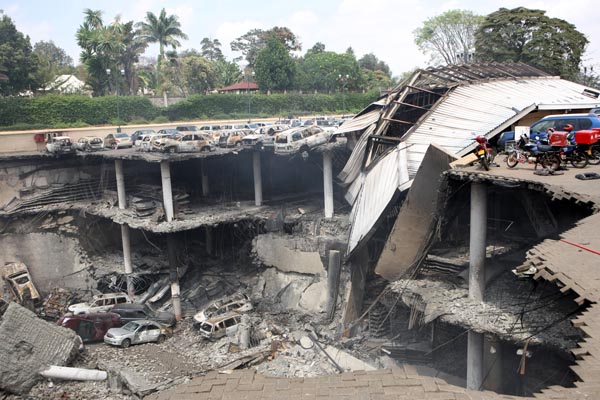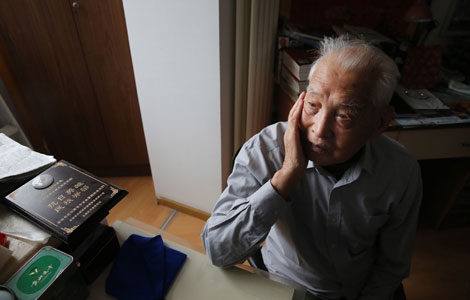Kenyan government faces tough questions over Nairobi attack
Updated: 2013-09-30 01:27
(Agencies in Nairobi)
|
|||||||||||
Pressure mounted on the Kenyan authorities a week after the Nairobi mall carnage amid questions over the fate of the missing and accusations on Saturday that top brass failed to heed security warnings.
President Uhuru Kenyatta has vowed not to bow to the al-Shabaab group, which claimed responsibility for the Westgate Mall bloodbath and threatened more attacks if Kenya failed to pull its troops out of Somalia.
 |
|
A section of the Westgate Mall in Nairobi that collapsed after explosions on Sept 23, as security forces battled with terrorists.KENYAN PRESIDENCY via Agence France-Presse |
But his administration faced tough questions after the leaking of an intelligence report dated Sept 13 that warned of an elevated risk, which some top officials said was treated too casually.
Senior security officials said on condition of anonymity that an intelligence report warning of an attack had been sent to the treasury, interior, foreign and defense ministers, as well as the army chief.
"Briefs were made to them of increasing threats of terrorism and of plans to launch simultaneous attacks in Nairobi and Mombasa around Sept 13 and 20," according to the report, quoted in the Nation newspaper.
The report also said Israel, which has close security ties with Kenya, had warned of plans to attack Israeli-owned property in September, a month that included several Jewish holidays.
The Westgate Mall, popular with expatriates and wealthy Kenyans, is part owned by Israelis and had long been considered a prime target.
Lawmakers are to grill the head of the NIS intelligence agency that produced the report and other top brass on Monday.
One top security official, speaking on condition of anonymity, said Kenya's security apparatus had been casual in its response to the flow of intelligence warnings.
"There is no way one can say there was no intelligence on this attack because those reports started trickling in from late last year. And they were specific with targets including Westgate," he said.
"Whenever these reports come, they are shared all across the government with relevant authorities at high levels, but they still take them casually."
The media have been awash with reports of the possible involvement in the brazen Sept 21 commando operation of Samantha Lewthwaite, a white British woman with ties to jihadist groups.
Diplomats, however, have said there is no evidence linking the "White Widow" to the attack on the Westgate Mall.
Analysts say instead that the scarce information available points to a key role played by militants based in Kenya, which has a large ethnic Somali community.
Travel warnings
The United States issued an updated advisory on Friday warning of "the risks of travel to Kenya". Other countries have also warned their citizens.
The Kenyan government reacted angrily, condemning the advisory as "unnecessary and uncalled for" and urging Washington to withdraw it.
The official mourning period ended on Friday but burials were still being held on Saturday for some of the 67 known victims of the attack, which killed a popular radio host, relatives of the president and several foreigners, including a prominent Ghanaian poet.
The turbaned gunmen who infiltrated Westgate Mall arrived with a set of religious trivia questions: As terrified civilians hid in toilet stalls, behind mannequins, in ventilation shafts and underneath food court tables, the assailants began a high-stakes game of 20 questions to separate Muslims from those they consider infidels.
A 14-year-old boy saved himself by jumping off the mall's roof, after learning from friends inside that they were quizzed on names of the Prophet Muhammad's relatives. A Jewish man scribbled a Quranic scripture on his hand to memorize, after hearing the terrorists were asking captives to recite specific verses. Numerous survivors described how the attackers from al-Shabaab shot people who failed to provide the correct answers.
Their chilling accounts, combined with internal al-Shabaab documents discovered earlier this year by The Associated Press, mark the final notch in a transformation within the global terror network, which began to rethink its approach after its setbacks in Iraq.
AFP—AP
Today's Top News
Website launched to assist expat professionals
50 foreign experts honored with Friendship Awards
Up, up, Huawei finds new friends in Europe nations
Visible face of CIC investment
Shanghai opens free trade zone
Academic warns Obama on Pacific policy
Little-known now, but a big future
NSA mapping social networks of US citizens
Hot Topics
Lunar probe , China growth forecasts, Emission rules get tougher, China seen through 'colored lens', International board,
Editor's Picks

|

|

|

|

|

|





